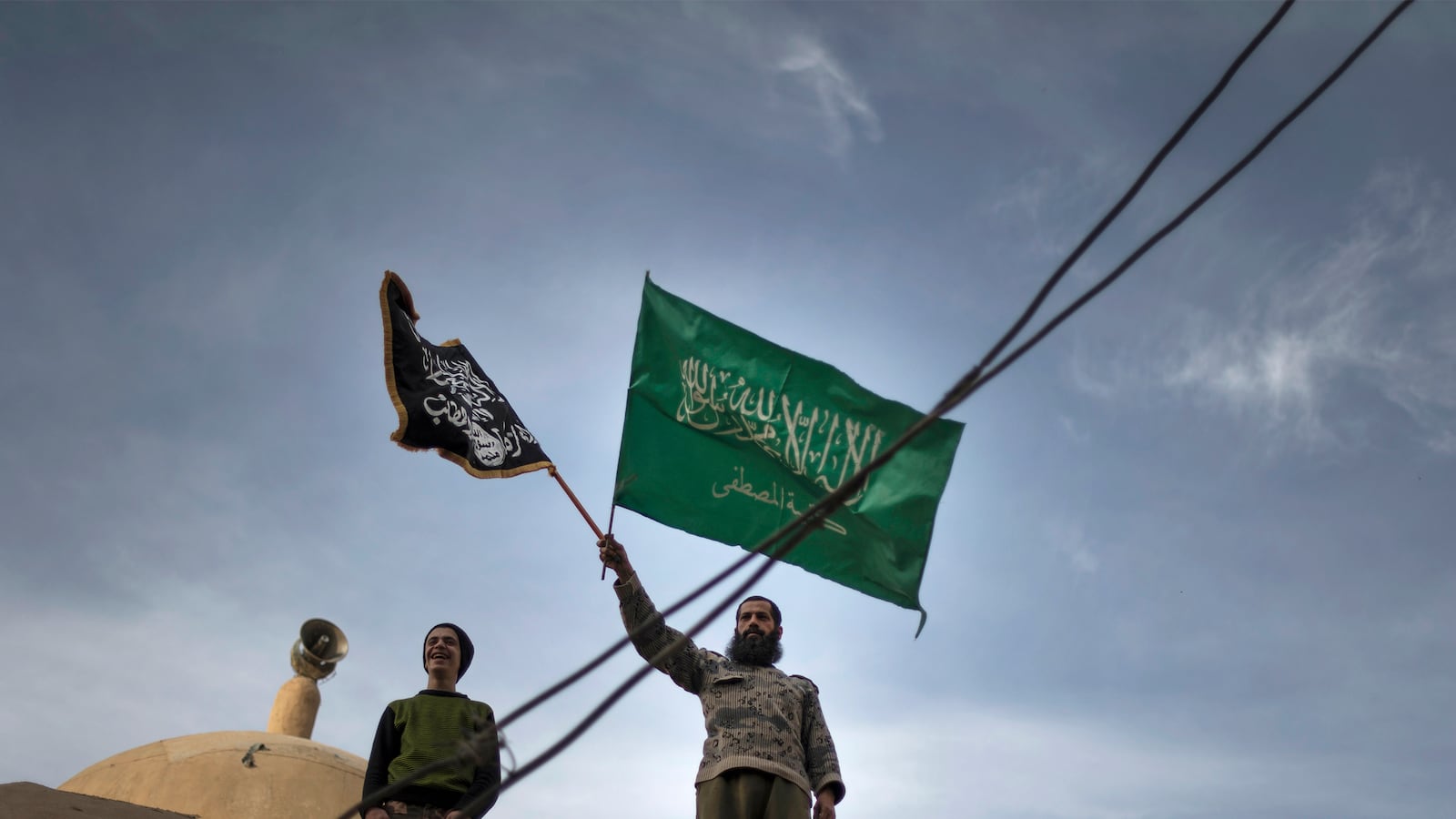The commander of Division 30, one of the Syrian rebel groups from which the U.S. recruits, has allegedly defected from the train-and-equip program, according to a message he posted on social media, amid rumors (and denials) that he may have actually gone over to Jabhat al-Nusra, the official al Qaeda franchise in his war-ravaged country.
Division 30 has formally acknowledged that it lost contact with Major Anas Obaid (a.k.a. Abu Zayd) in the Aleppo suburbs where he, along with 71 other rebels graduated from the New Syrian Forces (NSF), as the Pentagon proxy army is known, reportedly were dispatched on September 19, after completing their training in Turkey. Division 30 also addressed speculation that Abu Zayd flipped to the jihadists and says that if this information is confirmed, it will try him for treason.
However, U.S. Central Command has told The Daily Beast that Abu Zayd was not actually one of the graduates of its program. It’s true that not all Division 30 members make the cut to join the NSF, although if Abu Zayd abandoned the rebel faction this would no doubt embarrass and frustrate U.S. plans to find a credible, “moderate” pool from which to recruit anti-ISIS counterinsurgents. In an emailed statement issued Wednesday, Central Command stated that it had “no indication that any NSF fighters have defected to Al Nusra Front” and “all Coalition-issued weapons and equipment are under the positive control of NSF fighters.” But U.S. officials have also said that Washington does not track or exercise command-and-control of its proxies once they enter Syrian territory. Last week, the Pentagon said that one fighter from its first class of 54 graduates had been captured by “anti-Syrian forces.”
Abu Zayd does appear to have gone rogue, and he claims all his men have, too. “In the name of God, the Compassionate, the Merciful, we, the grouping of revolutionaries of Atareb and its countryside, announce that we are outside Division 30 Infantry and we are an independent faction working on the Syrian lands in isolation from coordination with the international coalition,” he posted to his personal Facebook page on Tuesday. “And we confirm to the Syrian people that we will fight the khawarji of the age [a reference to the Islamic State] and respond to their aggression in Aleppo and its countryside.”
Division 30 also acknowledged that it had not heard from Abu Zayd since his deployment into Syria, and felt compelled to disclaim any broad organizational link to al-Nusra. “In the name of God, the Compassionate, the Merciful: We, the leadership of Division 30 Infantry, deny strongly any contact with Jabhat al-Nusra; and what happened with Major Anas Obaid, till now we have not been able to confirm from him because the connection is cut off with him,” the group noted on its own Facebook page. “In the event that this has happened we will submit him to the military court on accusations of high treason because these arms are not his property but those of the Syrian people. And the accused is innocent till proven guilty.”
Captain Ammar al-Wawi, the official spokesperson of Division 30 refuted Central Command’s denial that Abu Zayd was not part of the train-and-equip program but said he didn’t know the missing rebels whereabouts or current affiliation. In a phone call, he told The Daily Beast: “I can neither confirm nor deny that the defection has happened. If it’s true, this defection was expected. We warned those in charge of this program. There was also a request from the overall commander of Division 30 to suspend [Abu Zayd] before he completed his training because we had information that this was going to happen but those in charge of the program refused to suspend him.”
A Western source within the Nusra Front told The Daily Beast that not only is Abu Zayd’s defection true, but other elements of the NSF directly handed all their weapons to Nusra upon entering Syrian territory on Sunday evening, specifically at the town of Atareb, in the Aleppo governorate.
“The Division 30 leader was arrested by Nusra when he entered Syria,” said Abu Saeed al-Halabi, a Dutch member of Nusra. “He was planning to leave Division 30 with his group. He will lead a new group from his city of Atarib. He proposed giving Nusra a large number of his vehicles and weapons in return for protection and freedom. He spoke out against the U.S., and will fight against the Assad-regime despite his deal with the U.S. [not to].”
Others are skeptical of this story and insist it’s al-Nusra’s way of planting disinformation to further weaken a long-bedeviled American counterinsurgency program. “This is media propaganda from al-Nusra,” Rami Abdul Rahman, of the London-based Syrian Observatory for Human Rights, told The Daily Beast. “No one has defected.” One U.S. intelligence official said that while he could not rule out Abu Zayd’s defection, the story should be “taken with a big grain of salt.”
The Syrian Observatory was the first to report on the entry of the second class of NSF graduates, from Division 30 and another Free Syrian Army-aligned group, Soqour al-Jabal. The entire contingent was said to have crossed into northern Syria in a convoy of 12 4×4 vehicles, all equipped with mounted machine guns.
If Abu Zayd’s defection is proven, it would come about 48 hours after Division 30’s chief of staff, Col. Muhammad al-Daher, also pulled out of the Pentagon train-and-equip program, citing six problems with it including a “slowness in the implementation of the training program,” the “lack of seriousness in the implementation of the project” and the “lack of accuracy and methodology in the selection of teams.” And today, Bloomberg reported that retired Gen. John Allen, handpicked by President Obama to act as envoy to the anti-ISIS coalition, was stepping down in a few weeks, a move attributable both to his frustrations with White House war policy and an ailing wife.
The NSF has been widely judged a fiasco, with administration officials casting about to lay blame for the moribund program on advisors to Obama, past and present, who had advocated arming Syrian rebels earlier and more comprehensively (albeit to fight the Bashar al-Assad regime, not ISIS). In early August, the U.S. military lost control of its first class of 54 fighters as they dispersed shortly after receiving training. Later that month, the Syrian Observatory claimed that al-Nusra had released seven of the captured rebels.
Last week, the U.S. military said it currently has lost count of 18 fighters and another one is being held in captivity, but refused to say by which group. Since that announcement, another 71 fighters entered Syria, the Pentagon said Monday.
Division 30’s spokesperson al-Wawi said: “We do not want the program to fail but the Americans have not been willing to work with the well-known defected officers from the Syrian military who have expressed interest in collaborating despite the personal risk associated with doing so.” Al-Wawi added that a major deficiency in the Pentagon’s program was with the U.S.-designated recruiters; he hinted that some of the selected figures are seen as too close to the Assad regime and therefore deemed untrustworthy by the armed opposition.
“This is yet another piece of evidence that the U.S. policy in Syria is, at best, incoherent and, at worst, counterproductive,” Chris Harmer, an analyst at the Washington, D.C.-based Institute for the Study of War, told The Daily Beast. “Division 30 is a colossal failure. We spent a lot of money, but that doesn’t even matter — it’s the goodwill we have squandered. Every day the U.S. continues to accept the presence of the Assad regime, we lose the remnants of whatever goodwill we have left; 90 percent of the Syrian public wants the regime gone. That means 90 percent of the Syrian public does not see the U.S. as a reliable in its future reconstruction.”
—With additional reporting by Nancy Youssef, Shane Harris, and Wladimir van Wilgenburg
—3:26 p.m. Weds. Sept. 23: This article has been updated to reflect U.S. Central Command’s statement following publication.






